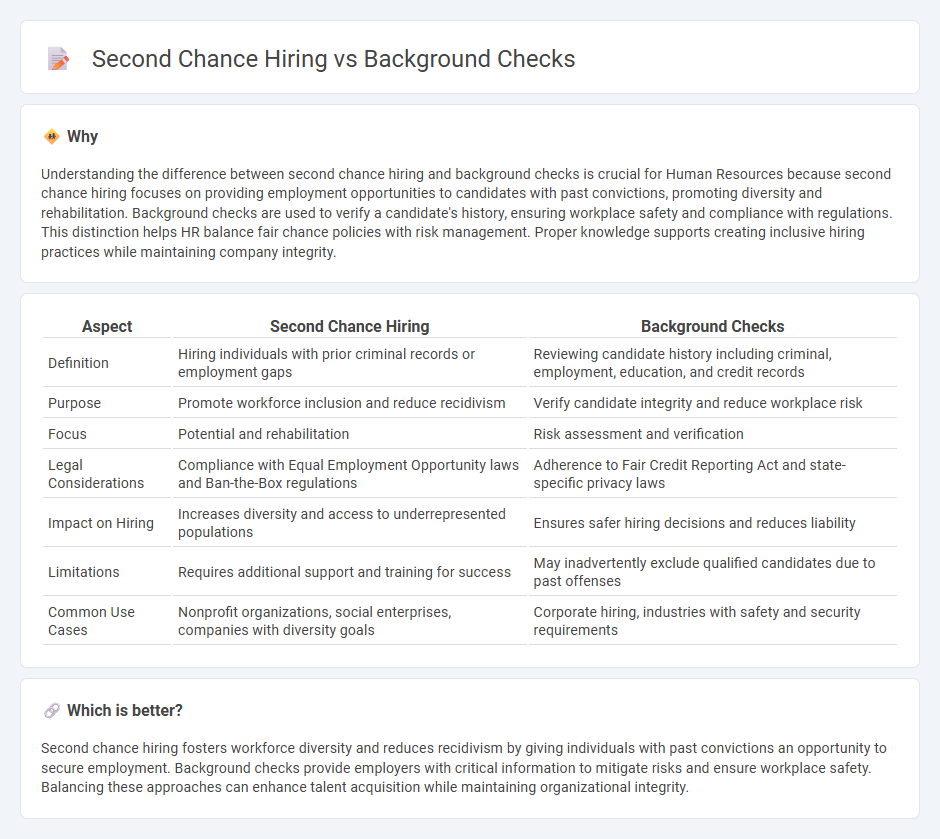
Second chance hiring focuses on providing employment opportunities to individuals with criminal records, emphasizing rehabilitation and reducing recidivism, while traditional background checks primarily serve to assess risk and ensure workplace safety. Employers balancing these approaches can foster inclusive work environments and tap into a broader talent pool without compromising security. Discover how integrating second chance hiring with thorough background checks can enhance your human resources strategy.
Why it is important
Understanding the difference between second chance hiring and background checks is crucial for Human Resources because second chance hiring focuses on providing employment opportunities to candidates with past convictions, promoting diversity and rehabilitation. Background checks are used to verify a candidate's history, ensuring workplace safety and compliance with regulations. This distinction helps HR balance fair chance policies with risk management. Proper knowledge supports creating inclusive hiring practices while maintaining company integrity.
Comparison Table
| Aspect | Second Chance Hiring | Background Checks |
|---|---|---|
| Definition | Hiring individuals with prior criminal records or employment gaps | Reviewing candidate history including criminal, employment, education, and credit records |
| Purpose | Promote workforce inclusion and reduce recidivism | Verify candidate integrity and reduce workplace risk |
| Focus | Potential and rehabilitation | Risk assessment and verification |
| Legal Considerations | Compliance with Equal Employment Opportunity laws and Ban-the-Box regulations | Adherence to Fair Credit Reporting Act and state-specific privacy laws |
| Impact on Hiring | Increases diversity and access to underrepresented populations | Ensures safer hiring decisions and reduces liability |
| Limitations | Requires additional support and training for success | May inadvertently exclude qualified candidates due to past offenses |
| Common Use Cases | Nonprofit organizations, social enterprises, companies with diversity goals | Corporate hiring, industries with safety and security requirements |
Which is better?
Second chance hiring fosters workforce diversity and reduces recidivism by giving individuals with past convictions an opportunity to secure employment. Background checks provide employers with critical information to mitigate risks and ensure workplace safety. Balancing these approaches can enhance talent acquisition while maintaining organizational integrity.
Connection
Second chance hiring relies on comprehensive background checks to assess an applicant's past while identifying potential for rehabilitation and growth. Background checks provide critical data on criminal records, employment history, and qualifications, enabling HR to make informed decisions that balance risk and opportunity. This connection supports workforce diversity and reduces recidivism by integrating individuals with previous barriers into productive roles.
Key Terms
**Background Checks:**
Background checks provide employers with verified information on a candidate's criminal history, employment records, and education credentials to assess risk and ensure workplace safety. These screenings help organizations comply with legal requirements and make informed hiring decisions by identifying potential red flags early in the recruitment process. Discover how effective background checks balance security with fair hiring practices to promote inclusive workforce policies.
Criminal Records
Criminal records play a critical role in both background checks and second chance hiring practices, impacting employment opportunities and workplace safety. Background checks provide employers with detailed criminal history to assess risk, while second chance hiring emphasizes rehabilitation and the potential of individuals with past convictions. Explore how balancing these approaches can create fair hiring solutions and promote workforce reintegration.
Employment Verification
Employment verification plays a critical role in background checks by confirming a candidate's job history, credentials, and qualifications to ensure workplace safety and reduce hiring risks. Second chance hiring emphasizes assessing candidates beyond their past mistakes, focusing on skills and potential for rehabilitation rather than solely on negative background information. Explore how combining thorough employment verification with second chance hiring can create inclusive and effective recruitment strategies.
Source and External Links
What are background checks and security clearances? - Background checks verify reliability and suitability for federal jobs by reviewing personal, work, and educational history and may include fingerprinting; security clearances require more detailed information depending on job sensitivity.
Background Check - DPSCS - Maryland's background check process includes fingerprinting services and requires fees, with options for employers and individuals seeking criminal history records, emphasizing updated forms and procedures for processing requests.
First Advantage: Global Background Checks & Screenings - A commercial service offering advanced background screening solutions that integrate identity verification, continuous monitoring, and industry-specific checks to streamline hiring and reduce fraud risk.
 dowidth.com
dowidth.com